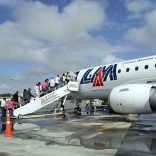Mozambique: Air transport carried a record 2.4 million passengers in 2024 - report
Mozambique – President says intervening in another bank would be painful

Lusa (File photo) / President Filipe Nyusi
President Filipe Nyusi said on Friday that a further intervention in the financial system would be painful and risk collapse, while noting that administrative intervention in two banks last year was necessary and urgent.
“It would be difficult for the country to be faced again with banks that required extraordinary intervention measures. Our budget does not have sufficient financial resources and nor should it sustain management actions or risks poorly calculated by banking professionals,” President Nyusi said at the inauguration of the new headquarters of Banco Comercial e de Investimentos (BCI).
Commercial banks, he continued, are called upon to adopt best practices in their activity, respecting prudential rules emanating from the central bank, and must guard against the risks inherent in their activity by creating more transparent mechanisms of communication with their clientele.
The president said the liquidation of O Nosso Banco was necessary and unavoidable, as was the dissolution of the board of directors of Moza Banco and respective recapitalization and sale decided upon last year by the Bank of Mozambique.
“The intervention carried out at Moza Banco and the withdrawal of the license from O Nosso Banco were unavoidable and necessary to protect the banking system from the risk of contamination, as well as to protect depositors and market stability”, President Nyusi said.
The central bank intervention, Nyusi continued, had bolstered the soundness and capitalization of the banking system, enhancing public confidence in the financial system.
The Moza Banco general shareholders’ meeting approved a capital increase of 8.17 billion meticais this month, after the Bank of Mozambique injected around 8 billion meticais to halt a collapse and prevent “an earthquake” in the national financial system.
Two months after the September intervention in Moza, of which Portugal’s Novo Banco is a major shareholder, the bank supervisor liquidated O Nosso Banco, majority-owned by the National Social Security Institute (INSS), and activated the deposit guarantee fund mechanism to reimburse individual depositors a maximum of 20,000 meticais.
Despite its small size, O Nosso Banco’s bankruptcy caused a wave of alarm, prompting the central bank to say there was no “reason for panic” and to promise that the financial system was sound, with an average solvency ratio of 14 percent, well above the 8 percent required by the supervisory body.












Leave a Reply
Be the First to Comment!
You must be logged in to post a comment.
You must be logged in to post a comment.